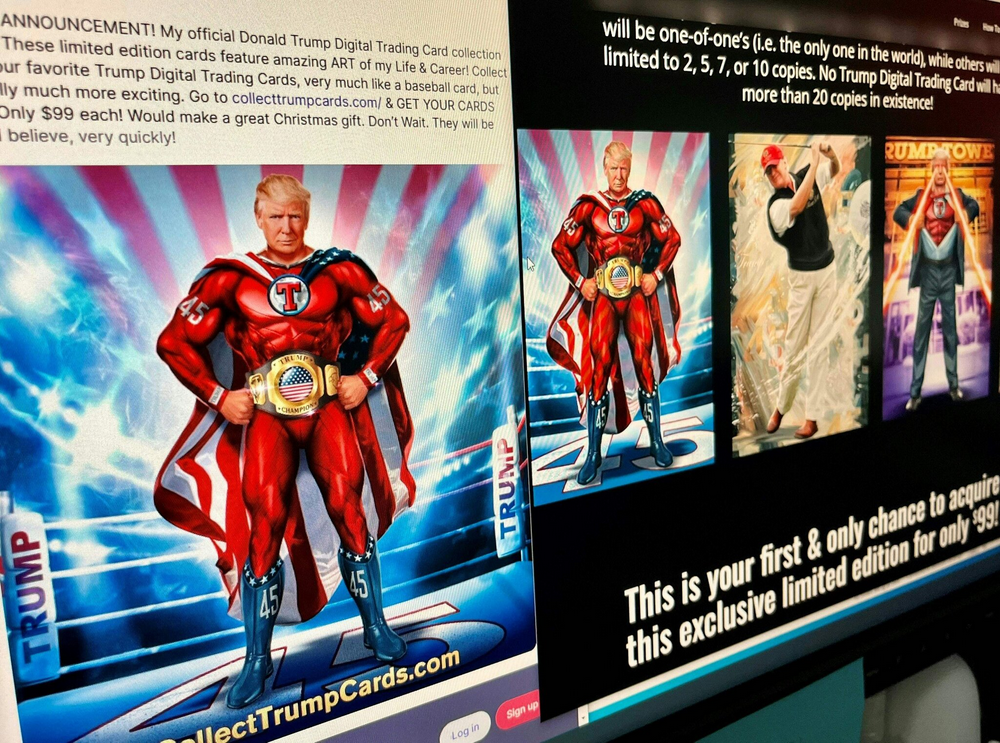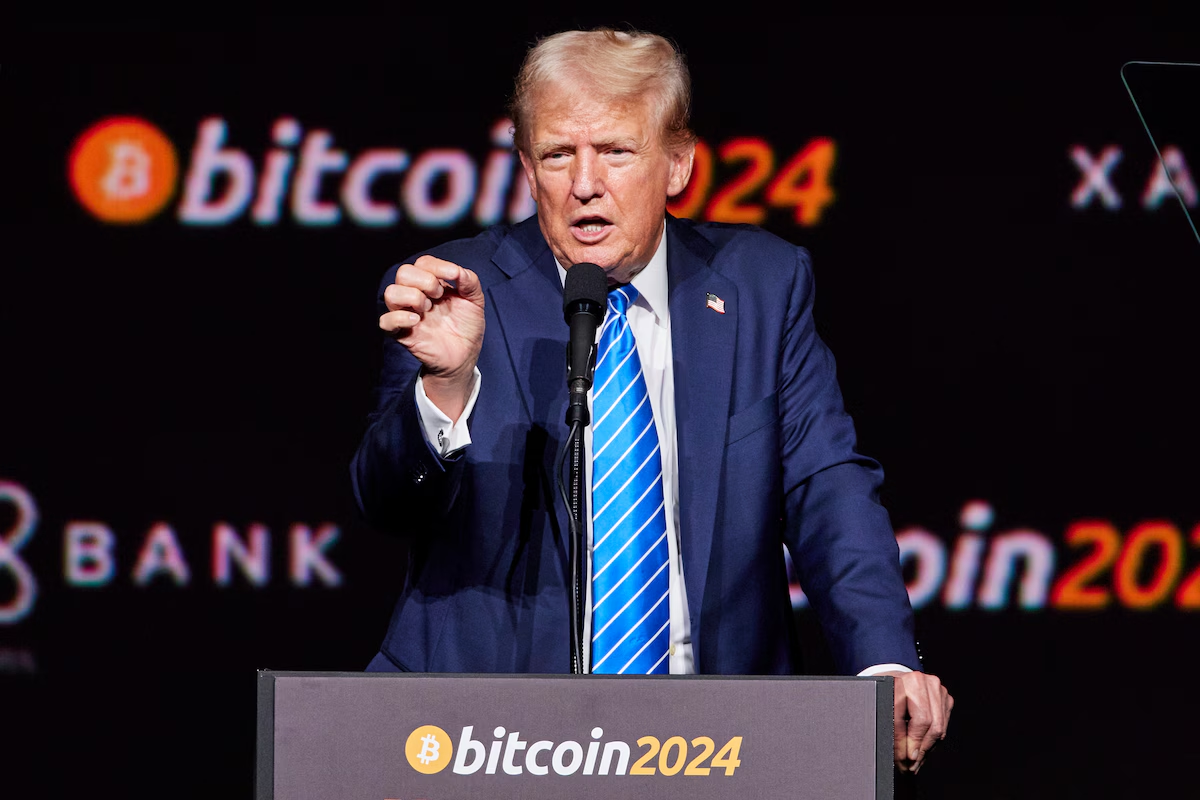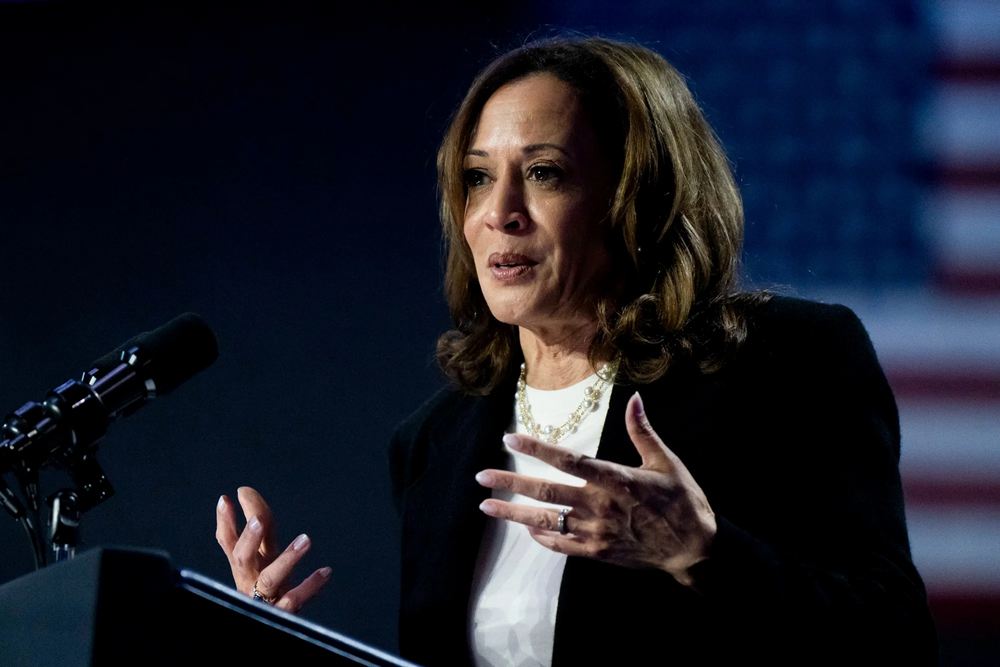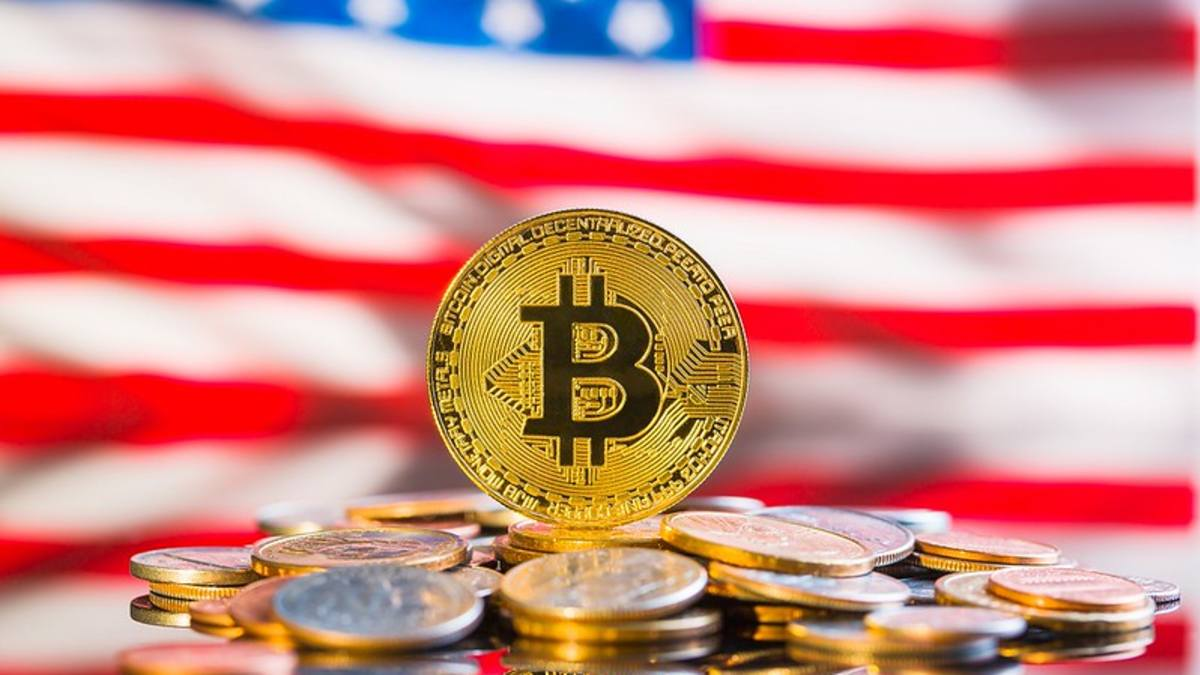Author: Zen, PANews
As of around 3 PM Beijing time on November 6, the counting of votes for the U.S. presidential election is still ongoing. According to estimates from several U.S. media outlets, Republican presidential candidate Trump has secured at least 270 electoral votes, which is expected to lock in his victory in this U.S. presidential election. Throughout the counting process, he has maintained a leading advantage. As of 10:30 AM Beijing time on November 6, according to Fox News data, Trump has won a total of 195 electoral votes, while Harris has won 117 electoral votes. Trump's significant lead resonates with the confidence and enthusiasm in the cryptocurrency market, with BTC reaching a new all-time high, surpassing $75,000.
After Connecting with NFTs, Bitcoin's "Critic" Changes Stance for the Election
Bitcoin and cryptocurrencies have been elevated to a topic of the presidential election for the first time, thanks to Trump, even though he was a critic at that time.
In 2019, then-President Trump tweeted that he was not a supporter of Bitcoin and other cryptocurrencies, criticizing them as not being money, with extremely unstable value and created out of thin air. He also expressed concerns about the series of issues arising from the lack of regulation in cryptocurrencies: "Unregulated crypto assets fuel illegal activities, including drug trafficking and other illegal activities."
Even though Trump showed disdain for Bitcoin at that time, the cryptocurrency market still viewed it as a "good omen." Jeremy Allaire, co-founder and CEO of Circle, directly stated on Twitter: "This could be the biggest bull market signal for Bitcoin ever. Cryptocurrency is now a presidential/global policy issue." Coinbase CEO Brian Armstrong also cheered on Twitter: "Achievement unlocked! A few years ago, I dreamed of a sitting U.S. president needing to respond to the growing use of cryptocurrency. They first ignore you, then laugh at you, then oppose you, and finally, you win. We just entered the third step."
Looking back now, Brian Armstrong's predicted victory has indeed arrived, at least for Trump. However, the shift did not come quickly. In the two years following his presidency, Trump maintained a critical view of Bitcoin. In June 2021, during a bull market in the crypto industry, Trump again blasted on Fox Business Channel: "Bitcoin looks like a scam," and expressed his dislike for it as a currency competing with the dollar. By the end of that year, despite his wife, former First Lady Melania Trump, launching her first NFT, Trump remained unimpressed, reiterating in a Fox Business interview: "I never liked it because I like the dollar."
The change in stance and views began with Trump issuing his own NFT series. Trump's longtime friend and co-author of "Think BIG and KickAss in Business and Life," Bill Zanker, was his initial "guide." Zanker stated in an interview that around early 2022, he pitched an idea to Trump: NFTs of former presidents for their artistic images. Zanker recalled that Trump was very interested but did not want to call them NFTs, instead referring to them as "digital trading cards on a computer," saying, "If you call them NFTs, people won't understand."

In December 2022, as the crypto market entered a severe winter, Zanker approached Trump again to ask if he was willing to continue the NFT project. Trump readily agreed, saying, "You know, many of my friends say I shouldn't do it. But I like it, let's do it." This could mark the beginning of Trump's ambition to become the "crypto president," just a month after he announced his candidacy for the 2024 presidential election.
Trump's NFT series quickly faced numerous doubts after its release, with confusion expressed even by former White House Chief Strategist Steve Bannon, who claimed that whoever convinced Trump to enter the digital token business should be fired. Additionally, several of Trump's current and former advisors indicated that this seemingly random business venture was a mistake that tarnished the identity of the 45th president. However, these critics, including Trump himself, did not anticipate that this business move would pave the way for his campaign as the "cryptocurrency president."
Becoming an Important Campaign Issue, Cryptocurrency is Pushed to "New Heights"
In March of this year, Trump began discussing the advantages of cryptocurrency: "I make money with it and have fun with it," referring to them as "crazy new money" during a CNBC interview. Two months later, while hosting "big holders" of his NFTs at Mar-a-Lago, he announced that he would "support" cryptocurrency and criticized Biden and the Democrats for "opposing cryptocurrency." Many believe this gathering marked a turning point in elevating cryptocurrency to a key issue in this campaign.
"I promise the Bitcoin community that on the day I take office, Joe Biden's anti-cryptocurrency campaign will end." After surviving an assassination attempt, Trump's passionate speech at the Bitcoin 2024 conference held in July ignited the cryptocurrency event; if it weren't for the "bitcoin2024" backdrop behind him, one might easily mistake it for a Trump rally.

At this conference, which marked a complete transformation into the "cryptocurrency president," Trump frequently delivered "golden quotes," stating, "If Bitcoin is going to the moon, I want America to be the country leading that trend," and he plans to make America the "crypto capital of the world" and "the world's Bitcoin superpower." When he announced that upon returning to the White House, he would fire SEC Chairman Gary Gensler, the audience erupted in enthusiastic cheers and applause. Furthermore, he stated that if re-elected, he would establish a presidential advisory committee to ensure that the regulatory framework for cryptocurrency becomes law.
Based on his pro-cryptocurrency stance, Trump received support from many well-known figures in the cryptocurrency industry, including Kraken founder Jesse Powell and Gemini co-founders the Winklevoss twins. Elon Musk, the "number one fan" of Dogecoin, which has an ambiguous relationship with cryptocurrency, became Trump's campaign cheerleader, investing significant time and resources to support him.
In the nearly six months leading up to the election, Trump frequently expressed enthusiasm for Bitcoin. He made bold claims about leading Bitcoin mining, stating that "all remaining Bitcoin should be produced in the U.S." He also used cryptocurrency to buy hamburgers at a Bitcoin-themed bar, becoming the first former U.S. president to use Bitcoin for payment, declaring, "This is the beginning of a new era."
Additionally, the Trump family launched a DeFi project called World Liberty Financial (WLFI) to provide lending services for cryptocurrencies on the Ethereum network. Trump himself has repeatedly previewed and promoted the project on social media; however, the WLFI token sales significantly fell short of initial expectations, forcing a drastic reduction in its target, with the final fundraising amount of $30 million down 90% from the initially sought $300 million. According to sources, WLFI plans to issue a stablecoin.
Unable to Remain Silent Any Longer, Harris Makes "Limited Overtures" to the Crypto Industry
In contrast to Trump's proactive approach, Democratic presidential candidate Kamala Harris was initially reluctant to invest much energy into the cryptocurrency issue. However, in the electoral struggle, Harris and the Democrats had to abandon their silence and make some compromises and commitments to the crypto industry.
The launch of the "Crypto for Harris" campaign marked the Democrats' response to Trump's appeal in the cryptocurrency industry, indicating that cryptocurrency has become an important issue that cannot be ignored in the confrontation between the two parties. At the Crypto4Harris roundtable held in August, Senate Majority Leader and Democratic Senator Chuck Schumer stated that if Kamala Harris is elected president, his goal is to pass bipartisan legislation supporting cryptocurrency by the end of this year, providing clear regulatory guidelines for the U.S. crypto industry. Several well-known crypto supporters, including billionaire Mark Cuban and SkyBridge Capital founder Anthony Scaramucci, also spoke at the event, discussing ways to support Harris's campaign and fundraising.
However, due to Harris herself and her campaign team members' absence from the event, the "Crypto4Harris" initiative was questioned by opponents, who claimed its goal was to persuade skeptics in the digital asset industry to believe they should support Harris's election. Many also believed that this event would have little impact.
In September, during a speech at the Pittsburgh Economic Club, Harris briefly mentioned blockchain for the first time, but her remarks were merely cursory. "We will invest in bio-manufacturing and aerospace, maintain our dominance in artificial intelligence and quantum computing, blockchain, and other emerging technologies, and expand our leadership in clean energy innovation and manufacturing." However, according to Bloomberg, Harris mentioned plans to encourage technologies, including "digital assets," during a fundraising event prior to this speech to attract donors.

In addition, in an 80-page economic plan on Harris's campaign website, one line states that if the Vice President is elected, she will "encourage innovative technologies such as artificial intelligence and digital assets while protecting our consumers and investors."
As the final sprint phase approaches, with Trump solidifying his position as the "crypto president," Harris's cryptocurrency policy has finally arrived, albeit late. On October 14, Harris announced a new policy aimed at providing more economic opportunities and other development opportunities for Black men, which includes "protecting cryptocurrency investments to ensure that investing Black men know their funds are safe."
Harris's move is clearly intended to attract Black male voters, a group that has long been crucial to the Democratic Party. This policy also faced considerable skepticism on social media, with some crypto supporters criticizing its use of identity politics. Harris's campaign team had to clarify that such plans would be implemented without any specific racial restrictions.
Compared to Harris's own silence on cryptocurrency, her "support team" has occasionally revealed more details. For instance, Mark Cuban stated to the media in July that Harris's campaign team had contacted him to inquire about digital asset issues. He later claimed that Harris's camp was "much more open" to cryptocurrency than the Biden administration. However, according to Mark Cuban himself, he did not make any donations to Harris.
Chris Larsen, co-founder and chairman of Ripple, is one of the largest individual donors from the cryptocurrency industry in this presidential campaign, having donated over $11.8 million to PACs supporting Harris's campaign. In an interview, he stated that his trust in Harris comes from conversations with people within her campaign team, believing that she could play a key role in correcting the significant mistakes made by the Biden administration regarding cryptocurrency policy.
The Biden administration has focused on encouraging so-called "responsible financial innovation" and "safe and affordable financial services," calling for a reduction in the "risks" posed by digital assets to various areas, including financial stability, cybercrime, and human rights. In May of this year, Biden vetoed a Republican-led congressional bill, stating that it "inappropriately limited the SEC's ability to establish appropriate safeguards and address future issues related to digital assets."
Additionally, while Harris has not publicly expressed dissatisfaction with Gary Gensler like Trump has, insiders have revealed that her transition team is reviewing candidates to replace the SEC chairman. Two possible successors are Chris Brummer, a professor at Georgetown University Law Center, and Erica Williams, chair of the Public Company Accounting Oversight Board (PCAOB), who are rumored to have a more optimistic view of cryptocurrencies like Bitcoin compared to Gensler.
Crypto Voters Become a Key Force in U.S. Political Elections
According to tracking and statistics from the bipartisan crypto advocacy organization StandWithCrypto, there are 355 candidates supporting cryptocurrency in congressional races, with 291 of them shifting from a neutral stance to an active one, and over 300 supporting at least one piece of legislation that favors cryptocurrency. Candidates across the country have issued over 1,900 statements supporting cryptocurrency, demonstrating that this issue is gaining attention throughout the political arena. Based on this, Coinbase CEO Brian Armstrong believes that next year, U.S. Congress members will be very friendly to the crypto market, stating it will be "the most pro-cryptocurrency Congress in history."

A recent poll conducted by the Digital Chamber of Commerce shows that one-seventh of potential voters (16%) consider themselves part of the cryptocurrency voting bloc. Among them, 40% of Black voters indicated that cryptocurrency is "very" or "extremely" important in deciding whom to support in 2024. Clearly, cryptocurrency voters are a force to be reckoned with in this election, significantly influencing the policy positions of both incumbents and challengers.
Now, both parties agree that the government should prioritize policies that encourage growth while protecting consumer freedoms. Most Republicans and Democrats indicate that supporting the crypto industry should at least be a moderate priority for the next president and Congress, with nearly one-third of Democrats and more than a quarter of Republicans believing it should be a "high" or "very high" priority.
Anthony Scaramucci, a supporter of Harris, is very optimistic about Bitcoin, stating that regardless of who becomes president, Bitcoin will rise. He believes that considering the market's potential reaction to a Trump or Harris victory, if Trump wins, Bitcoin may rise in the short term, as people generally view Trump as a deregulator who might overturn many of Biden's policies, but Harris has also expressed support for blockchain and Bitcoin.
Clearly, in this electoral "marathon," the cryptocurrency industry and its supporters have already achieved victory.
免责声明:本文章仅代表作者个人观点,不代表本平台的立场和观点。本文章仅供信息分享,不构成对任何人的任何投资建议。用户与作者之间的任何争议,与本平台无关。如网页中刊载的文章或图片涉及侵权,请提供相关的权利证明和身份证明发送邮件到support@aicoin.com,本平台相关工作人员将会进行核查。



